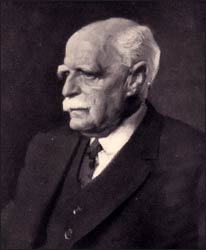By Marcus Braybrooke
THE FOUNDER OF THE WORLD CONGRESS OF FAITHS
Younghusband (seated in the middle, with the fur coat and hat) travelling in China for the British government in 1904. Photo: Wikipedia
Francis Younghusband, an interfaith pioneer who founded the World Congress of Faiths (WCF) in 1936, was born one hundred fifty years ago on May 31, 1863. His was a remarkable career. He was an explorer; he served in the army; was one of the first Europeans to cross the Gobi desert; explored dangerous mountain passes in the Himalayas; led a controversial military mission to Tibet; advocated self-government for India; and was a journalist and author. One reviewer said of his books: “Younghusband has written many books, each one worse than the one before” – which I take as a warning.
He was also a spiritual explorer. Although he was influenced by the example of the 1893 World’s Parliament of Religions, the primary motive for his interfaith work grew from his spiritual experiences. The word he most often used to describe them was “joy.” In an early book, The Gleam (1920), an autobiography written under a pseudonym, he says, “Essentials came out flaring as clear as sunlight. Joy surged through him.”

In Vital Religion (1940), he described a decisive experience on a mountain top near Lhasa. “Now there grew up in me something infinitely greater than mere elation and good-will. Elation grew to exultation, exultation to an exaltation which thrilled through me with overpowering intensity. I was beside myself with untellable joy. Never again could I think evil. Never again could I bear enmity. Joy had begotten love.”
Again, in the last year of his life, Younghusband, in his review of Sri Aurobindo’s The Life Divine, wrote, “Bliss is the motive power of the whole universe. He who has once reached the culmination of the Spirit will be filled with something far more deeply penetrating than love and sympathy. He will see and feel the Divine in all forms – animal as well as human. The Divine in them will touch the Divine in himself, till the joy that is in him will remain with them that their joy may be full.”
Despite their profound influence on him, Younghusband was reluctant to speak in public of these mystical experiences. He used more pragmatic arguments in advocating a “fellowship of faiths.”

In a broadcast before the 1936 World Congress of Faiths, he said, “I have come into the most intimate contact with adherents of all the great religions. This has forced me down to the essentials of my own Christianity. It has also forced me to see a beauty in the depths of theirs. The beauty of holiness I have learned to recognise wherever it is found.” He also recalled a car accident in Belgium: “No one enquired whether I was Aryan or non-Aryan… whether my religion was Hindu, Muslim, or Christian. None of these questions did they ask of me. They sprang to my help because of their fellow-feeling. I was a human like themselves. What hurt me hurt them.”
Younghusband was deeply influenced by the teachings of Tolstoy, Baha’ullah, and Sri Ramakrishna – indeed Christian leaders in Britain for some time criticised WCF as being a front for neo-Hinduism! Younghusband himself regularly attended church services, but he saw Jesus as a heroic example of love and self-sacrifice to be emulated – even surpassed – by others. His talk of “a Christ that is to be,” a “God-Child” or a “World Leader” from another planet was not welcomed by church leaders.

Sir Francis Younghusband died just over seventy years ago and was buried at Lytchett Minister. His ornate grave is in urgent need of restoration. An appeal to raise funds for a restoration is being planned. If you would like to help, please contact Tony Reese, WCF, 125 Salusbury Rd, London NW6 6RG.
Younghusband’s hope was that WCF would inspire a spiritual fellowship awakening in people of all traditions to this universal experience of cosmic joy. Younghusband envisaged the World Congress of Faiths as a worldwide movement, rather than as an organization. Indeed the ‘interfaith movement’ is far larger than any organization. Younghusband would certainly have welcomed its growth.
Even in the midst of World War II he called for a new moral order, grounded on the ethical teachings of the great faiths, as the basis for a lasting peace. He even hoped that “by 2036, WCF’s centenary would be celebrated in a Europe where war was unthinkable.” He called for a reconstituted League of Nations (the embryonic U.N.) to have an inter-religious advisory council – warning that “its efforts would not be of the slightest avail unless it was inspired by an irresistible spiritual impulse.” He spoke too of the need to care for Mother Earth, which he saw as a living organism, and suggested that if the pope and some staunch Protestants were to go walking in the Himalayas together, they could not fail to be struck by “a common bond.”
Yet whatever the practical benefits of interfaith co-operation, he was clear that at its deepest level, the search for fellowship of faiths becomes a search for truth and flows from communion with the divine. “At its intensest and highest, fellowship seems to be a communion of spirit greater, deeper, higher, wider, more universal, more fundamental than any of these – than even love.”
There are two biographies of Francis Youndhusband: one by George Seaver (John Murray, 1952) and the other by Patrick French (HarperCollins, 1994). I give a summary of his life and thought in my new book Widening Vision: The World Congress of Faiths and the Growing Interfaith Movement (available from www.lulu.com).


